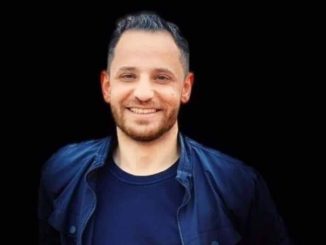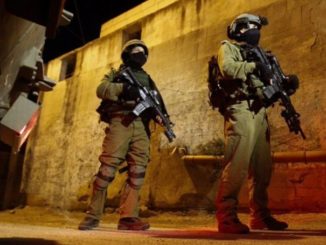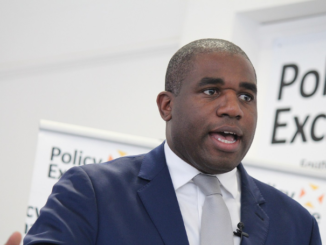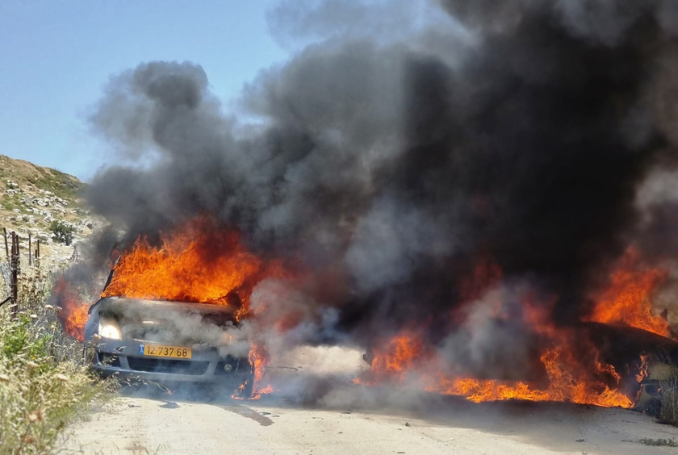
The citizens of Turmus’ayya are still reeling from the impact of that tragic day, assessing losses, processing the traumas, and trying to find their way back to some kind of normalcy.
The last few nights have been particularly tough for Palestinians in the Occupied West Bank as a result of the repeated settler attacks on their homes and properties.
The settlers were relentless, and the outcome, for Palestinians, was quite disastrous.
Thick walls of smog shielded the view of several towns and villages near the cities of Ramallah and Nablus after mobs of Jewish settlers set fire to Palestinian homes and vehicles. Flames and smoke engulfed many homes. The characteristic orange-tile roofs crumbled under the power of heat and fire.
The Palestine Chronicle visited some of the homes lost to the massive fires.
A Mother and a Baby
Ibrahim Obayat, 28, was at work on Saturday when he read a post on Facebook that groups of settlers had attacked his home in the village of Um Safa, north of Ramallah.
The violent invasions of the eastern area of the village were accompanied by the burning of houses and vehicles. Even nearby orchards were set ablaze.
“I returned to the village at full speed coming from Ramallah only to find its entrance closed by the Israeli soldiers,” Obayat told the Palestine Chronicle. He said that the soldiers prevented him from entering the village, so he had to take alternative roads. It took him 30 additional minutes to reach home. That delay proved decisive.
“I arrived at the house to find the settlers surrounding the neighborhood, smashing windows and burning rubber tires in preparation for burning our homes. My house’s windows were all shattered,” he said.
Ibrahim’s 20-day-old niece almost suffocated to death, he said. The settlers set her house on fire, destroying everything inside. The mother of a small baby, lost consciousness because of the thick smoke, collapsing on the floor with her baby in her arms.
“We called the ambulance and the fire department to come to the rescue, but to no avail,” he said. The soldiers simply wouldn’t allow anyone, aside from settlers, to enter. “After making a detour, they managed to reach the mother and the baby,” Obayat added with a sigh of relief.
Ibrahim’s brother’s house was set on fire as well. It was mostly destroyed.
Gassed to Death
According to the town’s people, the aim of these repeated attacks is to establish a new settlement outpost and to eventually gain greater control over Um Safa’s land.
A day after the attack, Zaher Tanatreh, 70, died because of heavy teargas exposure. The Israeli soldiers had lobbed many teargas canisters to prevent the Palestinian villagers from confronting armed settlers as they wreaked havoc in the village.
“Surveillance cameras’ recordings showed the heavy presence of Israeli soldiers as they accompanied the settlers while they burned and destroyed our homes,” Obayat said.
Indeed, such footage was available in abundance.
On June 21, Khaled al-Hajj was driving his car with his wife and his son’s family, who were visiting from the United States. As they drew closer to their home, in the town of Turmus’ayya, a group of vehicles were speeding closer to their house.
As the 63-year-old man saw the flames engulfing several buildings in the neighborhood, he rushed to his house, seeking safety for his family. The windows of the house, however, were all smashed, and the settlers were waiting.
“My son wanted to protect his wife and child, so he quickly entered the house’s front yard and rushed to close the gate. The settlers chased him, tried to break down, while other settlers threw stones,” al-Hajj told The Palestine Chronicle.
Miraculously, the family managed to escape unharmed. The neighbors’ house, however, was torched, and burned to the ground.
“My neighbor’s family had arrived from the US a few days ago. They were still inside the building when the Israeli settlers set the house on fire,” al-Hajj said.
“They were trapped inside the burning house for more than half an hour. In the end, they came out crying, their faces covered in black soot from the thick smoke. Some were gasping for breath as the smoke was suffocating.”
On that horrific day, the town of Turmus’ayya lost a beloved member.
The War on Turmus’ayya
Omar Jabara, 27, was trying to help the families trapped in their burning homes. He confronted the settlers, trying to keep them away from the properties. But the armed settlers shot him without hesitation. A bullet penetrated his chest, killing him on the spot.
Turmus’ayya, the peaceful village known for its beautiful houses and organized streets, was the main victim of the settler’s latest pogroms. Their raid left at least 30 homes and more than 20 vehicles burned.
Muhammad Jumaa, 56, told The Palestine Chronicle that he will never forget that horrible day.
Just an hour before the settler attack began, Jumaa had persuaded his elderly mother to spend time at his home.
When the attacks started, the local mosque’s loudspeakers called on the villagers to rush to the northern part of the town to hold back the hordes of settlers. Jumaa joined his fellow citizens to check on what had happened to his mother’s house.
“Everything was burnt,” he said, “the house, the yard, even the old car. Everything was black,” he told us.
In fact, Jumaa’s mother’s home was one of the first properties the settlers burned to the ground.
The situation was made even more difficult by the Israeli army’s decision to close the main entrance to the town, thus preventing Palestinian ambulances and firefighters from reaching the devastated neighborhoods.
Jumaa said the settlers were escorted by Israeli occupation soldiers throughout the entire aggression. “Why didn’t they prevent the attack?” he asked. “Why did they close the entrance to the town at a time when we were desperate for help, for ambulances and firetrucks?”
The citizens of Turmus’ayya are still reeling from the impact of that tragic day, assessing losses, processing the traumas, and trying to find their way back to some kind of normalcy.
With Israeli soldiers and armed settlers not far off, the coveted normalcy might not be entirely possible.
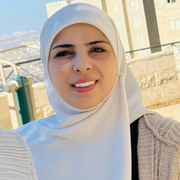
– Fayha’ Shalash is a Ramallah-based Palestinian journalist. She graduated from Birzeit University in 2008 and she has been working as a reporter and broadcaster ever since. Her articles appeared in several online publications. She contributed this article to The Palestine Chronicle.

